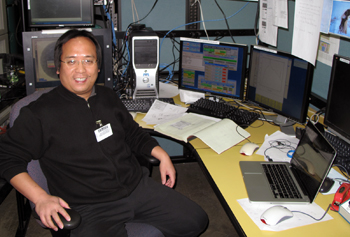A research team headed by Oakland University Assistant Professor of
Physics Yuejian Wang has solved a 50-year-old, material physics riddle
and gained insight that promises to offer modern industry a new,
affordable cutting material.
In a paper recently published in the scholarly journal Scientific
Reports, Wang and fellow researchers confirm that when placed under high
pressure at room temperature, graphite is transformed into an extremely
hard substance known as M-carbon. Until now, the crystal structure of
compressed graphite has been unknown. Although there have been many
theoretical predictions, none had been confirmed by experimental
verification.
What has long been known, however, is that
graphite, when subjected to both high pressure and high temperatures, is
transformed into diamond. Wang's research suggests that it is possible
to create M-carbon with high pressure alone.
"If we can make
M-carbon stable at ambient conditions – without the intense heating
required to form diamond – it could have a huge impact on industry
because it will rival the diamond's hardness and potentially be cheaper
to produce," he said.
The discovery comes as a result of a
three-year study that allowed Wang, while a postdoctoral researcher at
Yale University, and fellow investigators to analyze the crystal
structure of compressed graphite in detail. In addition to confirming
the M-carbon structure, they found that the compressed substance returns
to its original graphite state once the pressure is released.
Wang and his colleagues are now preparing to study methods of
preserving the M-carbon structure once pressure is released. This work,
like the compression work that preceded it, will be conducted at
national synchrotron facilities such as those located at Argonne
National Laboratory near Chicago and Lawrence Berkeley National
Laboratory.
"This work exemplifies the relevant, innovative
and ambitious thinking that the state of Michigan and the nation will
need to stay on top of a rapidly advancing global marketplace," said
Oakland University President Gary Russi.
"We're proud to
have Dr. Wang and a host of equally ambitious researchers contributing
vital and exciting new knowledge to disciplines across the academic and
professional spectrum."
To learn more about Wang's research, view the
study published by Scientific Reports or contact him at
ywang235@oakland.edu.

